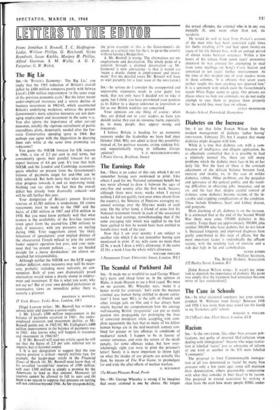Diabetes on the Increase SIR,-1 see that John Rowan Wilson
finds the modern management of diabetes 'rather boring' (SPECTATOR. February 25), but I suspect that many diabetics might disagree with him.
While it is true that diabetes can, with a com- bination of intelligence and diligent application, be so effectively controlled that it is possible to lead a relatively normal life, there are still many problems which the diabetic must face in his or her daily life. Not the least of these is the constant adjustment of the delicate balance between food, exercise and insulin, or, in the case of milder diabetics, tablets. Other problems are the prejudice and ignorance of the general public, and the result- ing difficulties in obtaining jobs, insurance, and so on, and the fact that, despite careful control of diabetes, some diabetics become victims of the in- curable and crippling complications of the condition. These include blindness, heart and kidney disease, and gangrene. Most alarming of all, diabetes is on the increase. It is estimated that at the end of the Second World War there were some 150,000 diabetics in this country. Today there are approximately 300.000, plus another 300,000 who have diabetes but do not know it Increased longevity and improved diagnosis have partly contributed to this state of affairs, but the most important factor is undoubtedly the affluent society, with the resulting lack of exercise and a rich diet high in fat and carbohydrate.
SUSAN KNIBBS Welfare Secretary, The British Diabetic Association 152 Harley Street. London, W I
[John Rowan Wilson writes: It wasn't my inten- tion to diminish the importance of diabetes. My point was simply that the treatment had nowadays become more or less standardised.]


































 Previous page
Previous page